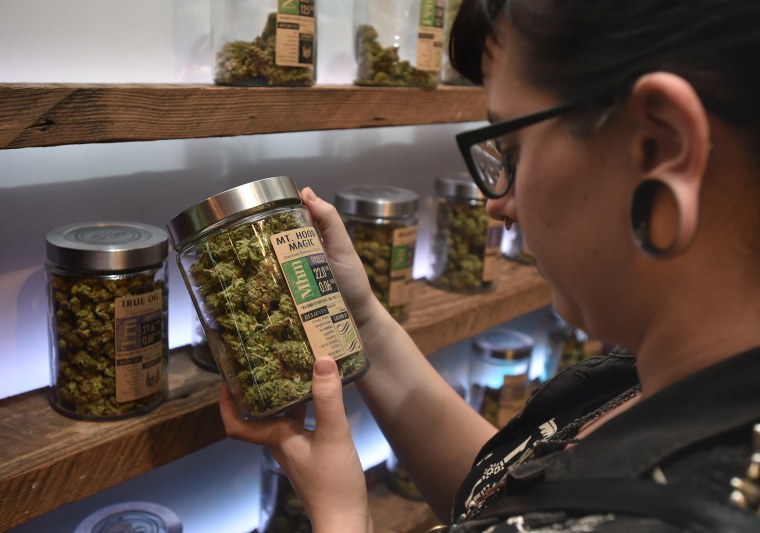Nine states have marijuana measures on the ballot this November, and chances are good that many will pass — giving pot advocates high hopes that the federal government will eventually lift its nationwide ban.
In five states — Arizona, California, Maine, Massachusetts and Nevada — voters will decide on legalizing the recreational use of marijuana.
In four others — Arkansas, Florida, Montana and North Dakota — voters will weigh in on medical marijuana, which is already legal in nearly half the country.
As Election Day approaches, polls and research show rising support for marijuana legalization: 57 percent of U.S. adults say marijuana should be made legal, compared to just 32 percent a decade ago, found a Pew study earlier this week.
Supporters say the shift in attitude is in part thanks to successes in Colorado and Washington, the first states where voters approved recreational marijuana in 2014.
"There's nothing more powerful when you're trying to affect social change than having examples out there that are actually working," Keith Stroup, founder and legal counsel at the nonprofit National Organization for the Reform of Marijuana Laws (NORML), told NBC News.
Detractors' fears about the dangers of legalizing pot "simply haven't materialized," he added. "They can't really make those arguments effectively today because we have more than two years of a track record in Colorado and Washington."

But Carla Lowe, founder of Citizens Against Legalizing Marijuana, called that "blatantly not true."
"The increase of kids' use has gone up dramatically," she said. "Many of those kids get into drugs, gangs and crime ... The social costs have been identified."
And marijuana still has a long way to go before it's accepted on the federal level. Just last week, the Drug Enforcement Administration denied a request to change its classification from Schedule I -- the most restrictive class which also includes heroin, LSD and ecstasy -- to a category with fewer restrictions.
Roger Morgan, founder and chairman of the anti-marijuana Take Back America Campaign, praised the DEA's move.
"It's an illegal drug by federal standards for good reason," he told NBC News.
The measures being voted on this year share many commonalities, namely that they would all legalize a limited amount of marijuana for individuals to possess (up to an ounce in most of the states) or grow (up to six plants in most of the states) for recreational use, and they have strict specifications on dispensing marijuana to patients for medical use.
"I think without question we are going to win California, and I really do believe that is the ultimate tipping point for this issue nationwide."
The Montana marijuana initiative differs in that it gives voters the chance to loosen restrictions on the current medical marijuana program in the state, as opposed to legalizing pot there in the first place.
Out of all the measures, California's Proposition 64 is seen as the most crucial: Not only is California the largest, most populous state in the country, but many see it as a bellwether on the issue.
Related: Battle Over Georgia's 'No-Buzz' Medical Marijuana Law Gets Personal
"I think, without question, we are going to win California, and I really do believe that is the ultimate tipping point for this issue nationwide," Stroup said.
Medicinal marijuana has been legal in California since 1996. A similar measure to Prop 64 to approve personal use of marijuana in California narrowly failed in 2010, but polls show that support now is hovering near 60 percent.
Morgan, the marijuana opponent, said California's existing recreational pot laws have revealed the problems with legalization.
"We already have over 50,000 illegal outdoor cultivation sites that are destroying our natural resources," he said. "The fertilizers and pesticides used are polluting the ground and the water table ... It's an environmental disaster, aside from the fact that today's high potency marijuana is extremely harmful [to users]."
Related: First-Ever Marijuana Fair Opens in Oregon with Competition
It's unclear whether the marijuana initiatives — long associated with a modest higher voter turnout in the past — will result in more people coming to the polls this year, or be advantageous to one party or the other, experts say.
"Conventional wisdom for decades has been that there are certain issues that will increase voter turnout to benefit certain parties. Democrats have relied on marijuana measures for that purpose for a long time. They claim that they're very successful in that," Josh Altic, Ballotpedia's director of ballot measures project, told NBC News.
But there's conflicting data on whether that's actually true, he said. And this year, with support for marijuana legalization broadening among Americans as a whole, there may be little to no boost for either party.
"I think it's safe to say that turnout will be higher because of having these issues on the ballot. I'm not as comfortable claiming that it's going to be a huge advantage for one party or the other," Altic said.
